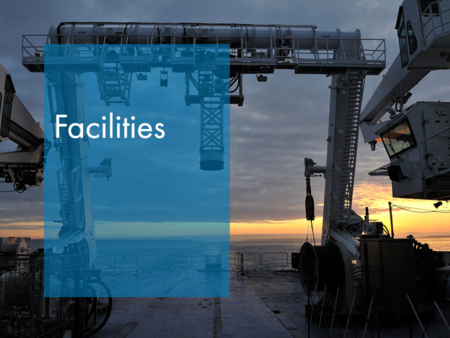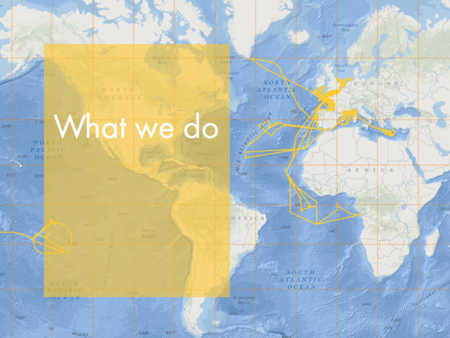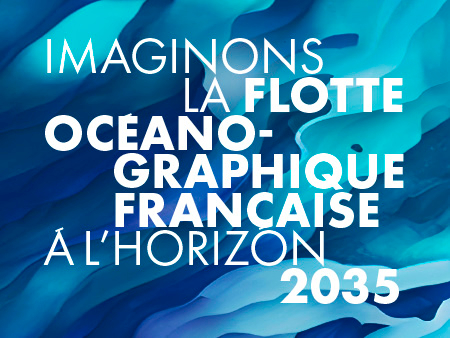Commission for coastal vessels (CNFC)
Missions
The CNFC is in charge of assessing the results of the French oceanographic campaigns scheduled by the fleet's Very Large Research Infrastructure (TGIR). The CNFC assess the scientific value-added of campaigns, both in terms of achievement of the campaign goals themselves (in the short term, on return from the campaign), as well as in terms of the medium-term goals (the scientific value-added for subsequent laboratory work, evaluated retroactively, four or five years after the campaign). The commission also assess the value-added of the teaching campaigns in terms of number of involved students and teaching staff, educational outputs, generated work, and value produced by the work generated at sea.
The CNFC is kept up-to-date of problems occurring during the campaigns (weather-related incidents, or operational or technical issues) to be able to decide on requests for additional days, as relevant. Annually, the Fleet management informs the commission on the actions taken based on fleet users’ feedback on cruise quality and the implemented corrective measures.
The CNFC provides advisory support for drafting calls for tenders for campaign projects proposed by the Fleet Management.
A campaign support fund offers additional funding to the funds raised by the scientific teams, for campaigns for which mobilization and/or demobilization take place outside mainland France. The CNFC is in charge of integrating the applications for support funds and submitting a proposal for the allocation of this support fund to the fleet’s Steering Committee.
Functioning
The CNF committees meet in plenary session twice a year, according to the schedules set out in Annex 2. As such:
- The CNFC meets once in the spring to assess the proposals for marine campaigns (if necessary, in coordination with the CNFH, it forwards to the CNFH the received files of campaigns falling under the responsibility of the CNFH, to be assessed in the fall), and once in the fall, to assess the value of campaigns carried out four or five years earlier. The files intended for assessing the value-added of teaching campaigns are examined one year after the campaign.
To ensure ongoing activity outside the plenary sessions, each committee has a Board, consisting of a chairman, two vice-chairmen, a secretary and representatives of various institutions. Additional committee members may be invited as necessary.
The Board maintains ongoing relations with the Scientific Council and the Fleet Management. It appoints the external experts who will assess the campaign proposals, as well as the rapporteurs and co-rapporteurs who will present the files at the plenary session.
The commission chairmen are permanent observers in the preparatory meetings of the FOF Steering Committee in an advisory capacity. Likewise, they are also permanent observers in an advisory capacity in Steering Committee meetings in debates on scheduling or subjects within their area of competence.
An interactive process between the CNF Board and the Fleet Management, including a formal meeting in the spring and in the fall, serves for communicating timetable developments (in the spring) and factoring the assessment results into the schedule (in the fall), before the final plan has been finalized by the fleet's Steering Committee.
Composition
- 23 deliberative members, each holding one vote. This includes the following appointed officials:
- Chairman
- Two vice-chairmen
- International full member
- Secretary.
- Several advisory members:
- A representative of each of the scientific directorates of the members of the fleet Steering Committee (IFREMER, CNRS, IRD and the French marine university network)
- A representative of the Fleet Management
- A representative of the National Agency for Research (ANR), if any campaign is part of a project already financed by the ANR.
- The chairman of the other CNF commission.
Each deliberative committee member has a designated alternate.
One or more technical observers on behalf of the Fleet Management and one observer on behalf of the National Oceanographic Instrumentation Center of the INSU, who primarily participate in the session in which the campaign proposals are assessed.
The CNFC is in charge of assessing proposals for French scientific and technological research campaigns and training and teaching campaigns using coastal vessels and the so-called mid-shore vessels (Alis and Antea).
The CNFH meets once in the fall to assess the proposals for marine campaigns and once in the spring, to assess the value of campaigns carried out four or five years earlier.
The evaluations are available in the reports of the CNFC.
Members of the CNFC
- Dominique Lefevre, président (CNRS Marseille) – Océanographie générale
- Laure Simplet, vice-présidente (Ifremer Brest) - Géosciences
- François Le Loch, vice-président (Ird Brest) - Halieutique - Réseaux trophiques
- Malika Oudia, secrétaire (CNRS Toulon)
- François Charles (CNRS Banyuls) – Biologie benthos
- Cécile Fauvelot (IRD Perpignan) – Biologie benthos coraux
- Urania Cristaki (Uclo Wimereux) – Biologie Pelagos Observation Microbiologie
- Dominique Davoult (Sorbone) – Biologie Pelagos Enseignement
- Yolanda Del Amo (Université Arcachon) – Biologie Pelagos Observation
- Aourell Mauffret (Ifremer Nantes) – Chimie Biogéochimie
- Aldo Sottolichio (Université Bordeaux) – Chimie Biogéochimie
- Pascal Bailly du Bois (Irsn Cherbourg) – Chimie Biogéochimie
- Martine Rodier (Ird Marseille) – Chimie Biogéochimie
- Florent Grasso (Ifremer Brest) – Géosciences
- Hervé Gillet (Université Bordeaux) – Géosciences
- Nicolas Robin (CNRS Perpignan) – Géosciences
- Cristèle Chevalier (IRD Marseille) – Océanographie Physique
- Pierre Garreau (Ifremer Brest) – Océanographie Physique
- Anne Lebourges-Dhaussy (IRD Brest) – Ressources halieutiques
- Angélique Jadaud (Ifremer Sète) – Ressources halieutiques
- Vincenzo Velluci (CNRS Villefranche-sur-Mer) – Technologie
- Loïc Dussud (Ifremer Brest) - Technologie




